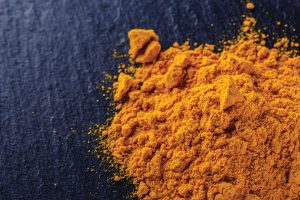In the U.S., turmeric is best known as a spice. It’s one of the main components of curry powder. In India and other parts of Asia, turmeric is used to treat many health conditions. It seems to have antiinflammatory, antioxidant and perhaps even anticancer properties.
Curcumin, meanwhile, is a naturally occurring chemical compound that is found in turmeric. The two words are sometimes used interchangeably, but the technical difference between the two is that turmeric is the yellowish powder used to flavor foods, while curcumin is a chemical contained within turmeric. In Indian and Asian cultures, turmeric and curcumin have a long history of use as a traditional herbal medicine, and Western medicine is beginning to study the potential of turmeric in treating diseases, such as cancer and diabetes.
Recent Science
Researchers are just beginning to investigate the health benefits of curcumin and turmeric, and are hopeful for benefits in fighting infections and some cancers, reducing inflammation and treating digestive problems.
The ability of curcumin to induce apoptosis in cultured cancer cells by several different mechanisms has generated scientific interest in the potential for curcumin to prevent some types of cancer. Oral curcumin administration has been found to inhibit the development of chemically induced cancer in animal models of oral, stomach, liver and colon cancer.
Meanwhile, human studies of curcumin in cancer prevention and treatment are in the very early stages. According to www.cancer.org, a study of 15 patients with colorectal cancer was conducted to find out how much curcumin they could safely take, and whether they could take a dose large enough to be detected in the blood. The patients were able to take 3.6 g of curcumin without noting ill effects. At this high dose, some curcumin and its products were found in the blood.
Even though it does not absorb well into the body, it has been shown to absorb into the colon lining and any cancerous tissue in the colon. The researchers recommended that the high dose be used when curcumin is tested for effects outside the intestine. Other small studies have found people were able to take up to 10 g per day for a period of a few weeks without noting problems. Some researchers are currently working on ways to increase absorption of curcumin by combining it with other substances. More clinical trials are needed to find out what role, if any, turmeric and curcumin may play in the prevention or treatment of cancer.
Further, in animal models of Alzheimer’s disease, dietary curcumin has decreased biomarkers of inflammation and oxidative damage. It is not known whether curcumin taken orally can cross the blood brain barrier or inhibit the progression of Alzheimer’s disease in humans. As a result of the promising findings in animal models, clinical trials of oral curcumin supplementation in patients with early Alzheimer’s disease are under way. The results of a six-month trial with 27 Alzheimer’s disease patients found that oral supplementation up to 4 g/day of curcumin was safe. Larger controlled trials are needed to determine whether oral curcumin supplementation is efficacious in Alzheimer’s disease.
Beneficial Form for Joints
A proprietary formulation of curcumin, with enhanced bioavailability, trade named BCM 95®, is one of the components of the study drug, Rhulief®. BCM 95 is a 100 percent turmeric extract with eight times more orally bioavailable curcumin. Rhulief contains 350 mg of BCM 95 and 150 mg of Bospure in a 500mg hard gelatin capsule.
A study was done to compare Rhulief to Celecoxib, a drug used to relieve pain, tenderness, swelling and stiffness caused by osteoarthritis. Thirty subjects had their joint pain measured over a 12-week period, and there was significant improvement seen in both groups. Specifically, in the Rhulief group, 85 percent of subjects were considered to have severe joint pain at baseline, with only 21 percent still in the severe category at the end of the study. It was concluded that Rhulief was effective in management of knee osteoarthritis, and the efficacy and tolerability of Rhulief was shown to be superior to Celecoxib.
Further, according to a New York Times article, “The Doctor’s Remedy: Turmeric for Joint Pain,” published October 19, 2011, Dr. Minerva Santos, director of integrative medicine at Northern Westchester Hospital in New York, said she frequently recommends turmeric to patients complaining of sore and achy joints, and uses it herself to relieve pain in her joints from sports and exercise. Santos advises her patients to find it in health food stores in pill or capsule form, and recommends a dose of 1,000 mg daily. The benefit of buying it in a bottle, she said, is that it’s usually combined with a compound called piperine, which aids absorption.
Recent science has backed up Santos.
A study published in The Journal of Alternative and Complementary Medicine in 2009 compared the active ingredient in turmeric, curcumin, with ibuprofen for pain relief in 107 people with knee osteoarthritis. The curcumin eased pain and improved function about as well as the ibuprofen.
Additionally, more research supports the benefits to people with osteoarthritis who used a unique extract of turmeric. Scientists in Italy have studied the pain relief, increased flexibility and other effects of a special, patented extract of turmeric roots.
In a recent clinical trial, researchers in Italy selected 50 patients with X-ray diagnosed osteoarthritis in either one or both knees to evaluate if the special turmeric formulation called Meriva® could provide more benefits to their standard medical therapy. Data showed that Meriva turmeric extract improves the clinical benefit of a standard NSAIDs-based treatment of osteoarthritis, making it possible for patients to decrease their medication load and increase its efficacy.
Resources:
• http://lpi.oregonstate.edu
• www.livestrong.com
• www.cancer.org
References:
Baum L, Lam CW, Cheung SK, et al. Six-month randomized, placebo-controlled, double-blind, pilot clinical trial of curcumin in patients with Alzheimer disease. Journal of Clinical Psychopharmacology. 2008;28(1):110-113.
R&D Lab, Arjuna Natural Extracts Ltd., Aluva, Kerala, India. “Clinical evaluation of a herbal formulation, Rhulief, in the management of knee osteoarthritis.”
Department of Rehabilitation Medicine, Faculty of Medicine Siriraj Hospital, Mahidol University, Bangkok, Thailand. “Efficacy and safety of Curcuma domestica extracts in patients with knee osteoarthritis.” Journal of Alternative and Complementary Medicine. 2009 Aug;15(8):891-7.
Belcaro G, Cesarone MR, Dugall M, Pellegrini L, Ledda A, Grossi MG, Togni S, Appendino G. “Productevaluation registry of Meriva®, curcumin-phosphatidylcholine complex, for the complementary management of osteoarthritis.” Panminerva Medica. 2010;52 (Suppl. 1 to No. 1):55-62.2.












